The decline of a great society doesn’t happen overnight….
There are certain stages and warning signs that are hard to miss. As you go about your day you may be like me and you come across a story or a fact or a chart that makes you pause ask yourself ‘that can’t be a good thing’. This book is my attempt to string these ‘that won’t end well’ events and stat together and look at macro trends happening in America and the world. Some of these trends have been going on for generations and others can be started or compounded from one election cycle to the next. I attempt break these patterns or trends into 25 categories and then researched and honed the arguments down to the top 12. This dirty dozen areas are what I believe are leading to the decline of a great society.
Taken individually one of these 12 topics can be seen as a crack in the foundation of what made America great. Taking them all in conjunction you can see how each of the chapters of this book contribute to a pattern and the piling together of the patterns are leading our Country to a decision point. Will this decision point be a conflict, will we wake up and change course, can we turn the ship around? These are all questions I ask myself every day. Hopefully this book will help you make decisions for your family, you community and your country. 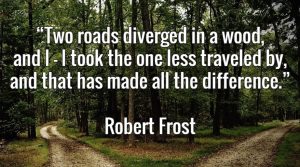
It will be easy to argue against a particular point I’m making but I challenge you to take the analysis of all 12 chapters in their entirety and judge for yourself. Judge our Country on the dozen items I put forward and ask yourself if we are a Country on the rise or the decline. Analyze your particular school, or city council. Use these points and start watching the TV pundits or reading your online news with a more enlightened analysis. Wake up to where we are heading as a society.
When researching this book, it helps me to look at the history behind some of the decisions or directions our country is taking. I’ve been fascinated with the formation of America. The debates, the amendments, the structure was all deliberately put together to ensure that the human desire for power and the focus on self interest would be minimized for a greater good. The Founders of our country studied the fall of great societies and tried to put in place a form of government that pitted branches of the federal government against each other. They pitted States rights against a Federalist system. They built a government and a nation that survived over 240 years. My contention is that the more we erode the founders original structure of government the more damage we’ve done to our Country. The erosion of State’s rights, the election of Senators from popular vote instead of from the State legislatures have all had profound and negative impacts on our society.
The natural inclination, as I researched this topic, is to step back and ask yourself ‘how does this end up?’.For me, knowing that the path we are on as a country doesn’t look very promising, ‘how do I take care of my family?’ In the final chapter I’ll spend some time pontificating on how our society will react to societal pressures, political vacuums and market gyrations. No one knows the future but we can look to the past to get inkling on what happens next.
This book has something for everyone, politically that is. I am a Republican, I do a morning radio show on a conservative talk network. I’ve run for elected office, I’ve helped Republican candidates and as an entrepreneur ‘I did build that’. I believe the free market is the best way to deliver goods and service between two parties. I believe in small government and lean libertarian on many issues. I stay clear of social issues relating to how people chose to live their lives. I’ve been blessed in my life and giving back through board services with organizations that I believe in.
My radio show, columns and this book is about putting ideas out into my community aimed at helping families figure out there future. This book is about how I see the my Country. For the past eight years I’ve emerged myself in politics, society and culture. Being a part of the media has given me access to the leaders and decision makers in my community, my State and in the Country. Over the years I’ve seen patterns emerge. I’ve seen the challenges at making true change at the ballot box, I’ve seen the contrast between liberal and conservative governance. I’ve observed how people handle the mantle of power and what affects their decisions. These life experiences have lead me to write this book.
Cycle of Decline
 When you look at the decline of other great societies there are historic clues that don’t always line up perfectly with the arguments I put forth in this book but there are definitely patterns that should scare you and make you take notice. Alexander Fraser Tytler, a European historian published The Decline and Fall of the Athenian Republic. In his analysis, Tytler concluded that from his research that the following stages of societal growth and decline are clear guideposts that great societies follow:
When you look at the decline of other great societies there are historic clues that don’t always line up perfectly with the arguments I put forth in this book but there are definitely patterns that should scare you and make you take notice. Alexander Fraser Tytler, a European historian published The Decline and Fall of the Athenian Republic. In his analysis, Tytler concluded that from his research that the following stages of societal growth and decline are clear guideposts that great societies follow:
“A democracy cannot exist as a permanent form of government. It can only exist until the voters discover they can vote themselves largesse from the public treasury. From that moment on, the majority always votes for the candidates promising them the most benefits from the public treasury, with the result that a democracy always collapses over a loss of fiscal responsibility, always followed by a dictatorship. The average of the world’s great civilizations before they decline has been 200 years. These nations have progressed in this sequence:
From bondage to spiritual faith,
From spiritual faith to great courage,
From courage to liberty,
From liberty to abundance,
From abundance to selfishness,
From selfishness to complacency,
From complacency to apathy,
From apathy to dependency,
From dependency back again to bondage.”
The American experience, at just shy of 240 years old, is following Tytler’s stages. From our Countries foundation and the push back against tyranny at the hands of the British empire to the 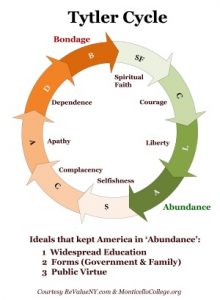 roaring 20’s, industrial revolution, post WWII economic booms on through to the rise of the counter culture, hippies, free love and into the rise of illicit drug use through the cocaine and crack 80’s and 90’s. The final stages we are now living include lack of trust in our governmental institutions from Congress to your local school district, the rise of the entitlement state and the ‘selfie generation’ who ask ‘what is my government going to do for me?’
roaring 20’s, industrial revolution, post WWII economic booms on through to the rise of the counter culture, hippies, free love and into the rise of illicit drug use through the cocaine and crack 80’s and 90’s. The final stages we are now living include lack of trust in our governmental institutions from Congress to your local school district, the rise of the entitlement state and the ‘selfie generation’ who ask ‘what is my government going to do for me?’
Historian Arnold Toynbee wrote a 12 part series in 1961 called A Study of History. Toynbe argued that civilizations travel through many distinct stage;
Genesis
Growth
Troubled Times
Universal State
Disintegration
Toynbee believed that a civilization declines not by external influences brought on by environmental concerns or attacks from invaders but his research showed societies become very good at problem solving but are not able to adapt to new, more sophisticated problems. Their societies have created too many layers and they’ve overdeveloped their problem solving structures and can’t adapt. 
He studied the role of the “Dominant Minority” that forces the minority to obey. The “Creative Minority” which once was the source of new ideas, adaptations and the ability of the minority to influence the majority continues to bask in the glory days of the past and looses their ability to challenge and push society into a new direction. .
He argues that the ultimate sign a civilization has broken down is when the dominant minority forms a large centralized ruling system, a central government or a Proletariat, which stifles political creativity. He states:
First the Dominant Minority attempts to hold by force – against all right and reason – a position of inherited privilege which it has ceased to merit; and then the Proletariat repays injustice with resentment, fear with hate, and violence with violence when it executes its acts of secession. Yet the whole movement ends in positive acts of creation – and this on the part of all the actors in the tragedy of disintegration. The Dominant Minority creates a universal state, the Internal Proletariat a universal church, and the External Proletariat a bevy of barbarian war-bands.
Tonybee argues that, as civilizations decay, they form an “Internal Proletariat” and an “External Proletariat.” The Internal proletariat is held in subjugation by the dominant minority inside the civilization, and grows bitter; the external proletariat exists outside the civilization in poverty and chaos, and grows envious. He argues that as civilizations decay, there is a “schism in the body social,” where groups are pitted against each other. Instead of virtue and community the people in the society become jealous and envious.
When short term gain for the ruling majority is bypassed for the long term gain of what is best for the society cracks emerge in the societal fabric. We will dig in deeply to the political structure, bureaucracy and once trusted institutions that are now corrupted or incompetent to deliver on their mission. America is moving towards an ‘every man for themselves’ philosophy and this shift is not only counter to what made this Country great but could spell the end of this great experiment envisioned 240+ years ago.
Wikipedia
Our society is straining at many levels, this book will try to provide you with the arguments that describe this decline. The rot is showing itself in our financial institution, our commercial sector, the education system and in many aspects of our societal contracts. The health of our institutions are manifesting in our our cultural decay.
For the past decade, I’ve been on a journey that first to fix my community, then to fix my State, then my Country. The further I researched and the more I learn the more I realized that we are living in a Country that is in the final stages of a great empire. Just like my great grandparents who fled Ireland in the mid 1800’s and moved to America for greater opportunity, I’m trying to impart upon my children and by this book impart upon whomever will do the hard analysis that you may have to leave the Country where you were born in to find opportunity in a different opportunity.
About Me
I am no different than many of my generation. I grew up as a Reagan Republican educated in Catholic schools through high school, put myself through college at the University of Arizona and studied Political Science and Economics. I’ve been an entrepreneur all my life. Coming from a middle class family I saw the life of a small business owner as the path to financial security and a life less ordinary. As I worked hard, found success and raised my family I had that moment where I asked myself ‘is this it?’ That searching led me to plug into the social program to help those less fortunate than myself. I gravitated towards Catholic organizations that needed the skills that God had given me. After years of running and growing businesses, raising my family and giving back to my faith I started seeing a patterns. The pattern that emerged was that no matter how much money we raised to help those less fortunate the ranks of those in need kept growing. Solving the pain and suffering in my community was more than raising money, it was about the direction our elected officials were taking my community.
The next logical step, crazy as the experience was, was to step up and run for elected office. I looked locally at where the concentration of power was an determined to run for a County Supervisor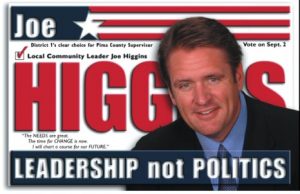 position and challenge a 16 year incumbent in the Republican Primary. I did not win but after much sole searching the race for office wasn’t’ about winning, it was about making my community better. As a candidate I did a number of local radio interviews. After the election, I was given the opportunity to co-host a morning radio show with Chris DeSimone. Our show expanded into 2 hours per day on morning drive time. After six years of probably the most fascinating time to have a ring side seat to State and national politics I started seeing patterns. I wrote them down, researched these patterns form a historical perspective, dug into stats and data to identify trends and project how these patterns would play out in our economy, our political system and in our culture. The patterns were developed into 12 categories that I put forth to show the decline of the American empire.
position and challenge a 16 year incumbent in the Republican Primary. I did not win but after much sole searching the race for office wasn’t’ about winning, it was about making my community better. As a candidate I did a number of local radio interviews. After the election, I was given the opportunity to co-host a morning radio show with Chris DeSimone. Our show expanded into 2 hours per day on morning drive time. After six years of probably the most fascinating time to have a ring side seat to State and national politics I started seeing patterns. I wrote them down, researched these patterns form a historical perspective, dug into stats and data to identify trends and project how these patterns would play out in our economy, our political system and in our culture. The patterns were developed into 12 categories that I put forth to show the decline of the American empire.
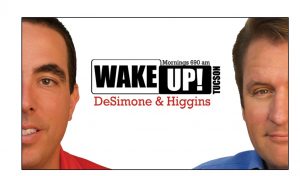 Each chapter of this book is dedicated to one of these arguments that I put forth demonstrate that America is on a trend that leads to only one conclusion. According to Tytler’s assessment our society is moving from Apathy and Dependency to Dependency and Bondage. You may disagree with a particular chapter but I encourage you to analyze my arguments in their entirety. I have no agenda, I am not selling any financial instruments to hedge against where I see our county going. I am simply putting forth where I see America heading and ask you to prepare, become aware and watch for future signs. I have no crystal ball as to when or how long the decline will take. We may stay in the Apathy and Dependence phase for decades. A jolt to the financial system that stops credit financing of American debt could move us to Dependency and Bondage overnight.
Each chapter of this book is dedicated to one of these arguments that I put forth demonstrate that America is on a trend that leads to only one conclusion. According to Tytler’s assessment our society is moving from Apathy and Dependency to Dependency and Bondage. You may disagree with a particular chapter but I encourage you to analyze my arguments in their entirety. I have no agenda, I am not selling any financial instruments to hedge against where I see our county going. I am simply putting forth where I see America heading and ask you to prepare, become aware and watch for future signs. I have no crystal ball as to when or how long the decline will take. We may stay in the Apathy and Dependence phase for decades. A jolt to the financial system that stops credit financing of American debt could move us to Dependency and Bondage overnight.
What started with a run for political office lead me to a 6 year journey on local conservative talk radio. To produce two hours every morning involved devouring every minutia of the news of the day. Our radio show involved local topics and our take on national issues. With interviewing everyone from dog catcher to US Presidential candidates patterns start to emerge. The more time I spent reading, tracking and interviewing the more I realized how genius the framers of America really were. They studied the rise and fall of great societies of the past, the Romans, ancient Greeks, the British Empire,
When you boil everything down, Countries are led by men and women that are fallible. Our constitution was set up to protect the Republic from the wills of majorities against minorities, from States against the Federalist system, from one branch of government against another. The more I saw what was happening in present day American the more I dug back into the foundation of our country. In reading the debates of our founding fathers it is apparent that they didn’t envision the intranet or nuclear weaponry but they did realize that leaders in the 1700’s, or 500bc have the same motivations as leaders in the 2000’s. They studied great societies of the past and put all sorts of circuit breakers in to stop or slow the greed, ego and natural tendencies for a government and bureaucracy to grow ever bigger and encroach on the liberty of the individual. Through this book there are major inflection points in our history that eroded the constitution and the framework that the founders envisioned. I would argue to our detriment.
From the beginning of society humans have had aspirations, inclinations, flaws, ego and desires to create a better world for our families. The foundation of this country, our Constitution was designed to keep our elected officials in check, to protect minorities from the tyranny of the majority. The people, through the ballot box, will ultimately retain and wield the power of their elected leaders. Our government was set up with a series of checks and balances to keep the people from being abused. Over the past 240 years, where we comprise, interpret for our times, or neglect these checks and balances we see our country slipping away from what made this great experiment work. Perhaps we need to go back to the original framework that made us great to restore those freedoms and put our government in check.
Freedom is never more than one generation away from extinction. We didn’t pass it to our children in the bloodstream. It must be fought for, protected, and handed on for them to do the same, or one day we will spend our sunset years telling our children and our children’s children what it was once like in the United States where men were free.
Ronald Reagan
A study of the past and a glimpse at the future;
From the formation of our government in the 1790’s through the Civil War in the 1860’s, on through the industrial revolution and right up to the Great Depression, America had a hands off philosophy surrounding the national economy. The Congress lacked the authority to dig into the day to day activities of the citizens and businesses. There were encroachments and shifts in thinking and shifts in policy but not until the FDR administration did we se wholesale shifts in the role of the Federal government and it’s role in every day American’s lives. The constitution protected the rights of States and the individual. The Framers understood the role of concentration of power in a central government and went to great lengths to reign in that power. For the majority of our Countries history is was every man for himself, rugged individualism, free markets and the freedom to freely engage in commerce.
Woodrow Wilson in 1887 glorified the role of the administration and ushered in a cadres of administrative elites who he believed had the scientific knowledge about human behavior and where better equipped to run society. He believed administrative power was to be insulated from politics just as engineering and medicine stood on their own. Wilson saw federal bureaucracies “of skilled, economical administration” comprising the “hundred who are wise” empowered to guide the “thousands” who are “selfish, ignorant, timid, stubborn, or foolish.” (The Study of Administration – Essay by Woodrow Wilson). Wilson believed that educted technorats were the answer in solving societies problems.
After the stock market crash of 1929 ushered in the Great Depression, the USA was at a crossroads. The pain brought on by the exuberance of the roaring 20’s caused quite a hangover. The cheap credit extended to the wealthy and powerful burst and the hangover was difficult to overcome. Hoover loosened credit and turned the US into the lender of last resort for the banks. With the recovery not taking hold, Hoover expanded Keysnian, government initiated spending programs that included work programs, agriculture controls and other top down controls and stimulation to get the economy moving.
With the election of FDR government intervention and stimulation went into overdrive. FDR’s New Deal brought the formation of the SEC, the FDIC, the NLRB, and the infamous WPA . For the first time in our nations history we jumped on the collectivism bandwagon. The checks and balances set up by the founders where trampled over. Leading to an attempt to court pack the Supreme Court in 1937 to overcome a series of rebukes to his legislative agenda. Government as last lender and savior of the day became in vogue and it continues today. Through LBJ’s war on poverty and creation of Social Security and Medicare all the way through Obama’s Affordable Care Act, economic stimulus and massive intervention by the Federal Reserve, our Country is drifting farther and farther from the beliefs and principals set forth by the Founders. In the end, Government is a trailing indicator to society, perhaps, as we go through the chapters of this book, you’ll find that we have the exact government that we deserve.
Solutions
All is not lost. There are short term and long term solutions that can put the American experience on the right track. The solutions range from improving education and building schools around teaching critical thinkers instead of factory workers. The solutions involve changing attidudes related to work and saving. The solutions involve instilling virtues back into society through stronger families units or active and engage faith networks.
Chapter 2 – Debt and Banking

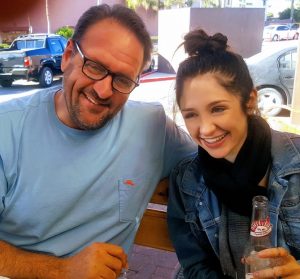

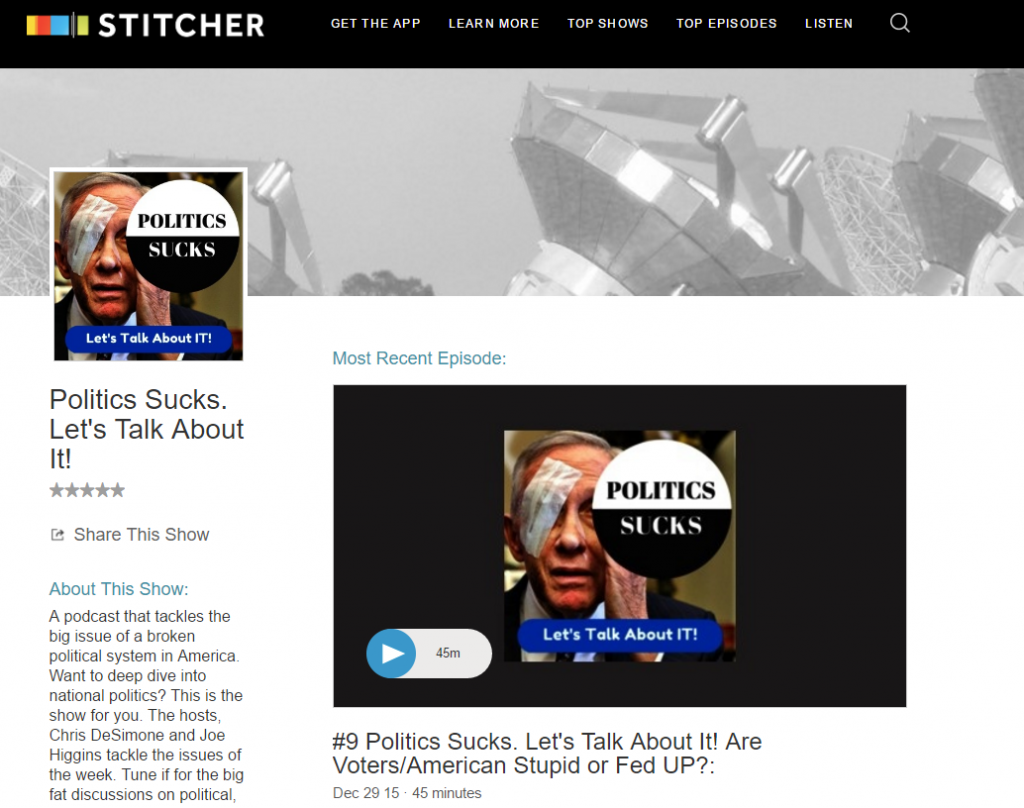

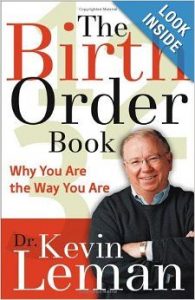

 And already, the campus on North Silverbell is expanding. Next year the school will offer academics through seventh grade, and plans to expand to eighth grade by 2017. And it’s not lost on Leman that the lot next to the academy is vacant. “Yes, I want a high school,” he admits with a chuckle.
And already, the campus on North Silverbell is expanding. Next year the school will offer academics through seventh grade, and plans to expand to eighth grade by 2017. And it’s not lost on Leman that the lot next to the academy is vacant. “Yes, I want a high school,” he admits with a chuckle.
 When you look at the decline of other great societies there are historic clues that don’t always line up perfectly with the arguments I put forth in this book but there are definitely patterns that should scare you and make you take notice.
When you look at the decline of other great societies there are historic clues that don’t always line up perfectly with the arguments I put forth in this book but there are definitely patterns that should scare you and make you take notice.  roaring 20’s, industrial revolution, post WWII economic booms on through to the rise of the counter culture, hippies, free love and into the rise of illicit drug use through the cocaine and crack 80’s and 90’s. The final stages we are now living include lack of trust in our governmental institutions from Congress to your local school district, the rise of the entitlement state and the ‘selfie generation’ who ask ‘what is my government going to do for me?’
roaring 20’s, industrial revolution, post WWII economic booms on through to the rise of the counter culture, hippies, free love and into the rise of illicit drug use through the cocaine and crack 80’s and 90’s. The final stages we are now living include lack of trust in our governmental institutions from Congress to your local school district, the rise of the entitlement state and the ‘selfie generation’ who ask ‘what is my government going to do for me?’
 position and challenge a 16 year incumbent in the Republican Primary. I did not win but after much sole searching the race for office wasn’t’ about winning, it was about making my community better. As a candidate I did a number of local radio interviews. After the election, I was given the opportunity to co-host a morning radio show with Chris DeSimone. Our show expanded into 2 hours per day on morning drive time. After six years of probably the most fascinating time to have a ring side seat to State and national politics I started seeing patterns. I wrote them down, researched these patterns form a historical perspective, dug into stats and data to identify trends and project how these patterns would play out in our economy, our political system and in our culture. The patterns were developed into 12 categories that I put forth to show the decline of the American empire.
position and challenge a 16 year incumbent in the Republican Primary. I did not win but after much sole searching the race for office wasn’t’ about winning, it was about making my community better. As a candidate I did a number of local radio interviews. After the election, I was given the opportunity to co-host a morning radio show with Chris DeSimone. Our show expanded into 2 hours per day on morning drive time. After six years of probably the most fascinating time to have a ring side seat to State and national politics I started seeing patterns. I wrote them down, researched these patterns form a historical perspective, dug into stats and data to identify trends and project how these patterns would play out in our economy, our political system and in our culture. The patterns were developed into 12 categories that I put forth to show the decline of the American empire. Each chapter of this book is dedicated to one of these arguments that I put forth demonstrate that America is on a trend that leads to only one conclusion. According to Tytler’s assessment our society is moving from Apathy and Dependency to Dependency and Bondage. You may disagree with a particular chapter but I encourage you to analyze my arguments in their entirety. I have no agenda, I am not selling any financial instruments to hedge against where I see our county going. I am simply putting forth where I see America heading and ask you to prepare, become aware and watch for future signs. I have no crystal ball as to when or how long the decline will take. We may stay in the Apathy and Dependence phase for decades. A jolt to the financial system that stops credit financing of American debt could move us to Dependency and Bondage overnight.
Each chapter of this book is dedicated to one of these arguments that I put forth demonstrate that America is on a trend that leads to only one conclusion. According to Tytler’s assessment our society is moving from Apathy and Dependency to Dependency and Bondage. You may disagree with a particular chapter but I encourage you to analyze my arguments in their entirety. I have no agenda, I am not selling any financial instruments to hedge against where I see our county going. I am simply putting forth where I see America heading and ask you to prepare, become aware and watch for future signs. I have no crystal ball as to when or how long the decline will take. We may stay in the Apathy and Dependence phase for decades. A jolt to the financial system that stops credit financing of American debt could move us to Dependency and Bondage overnight.